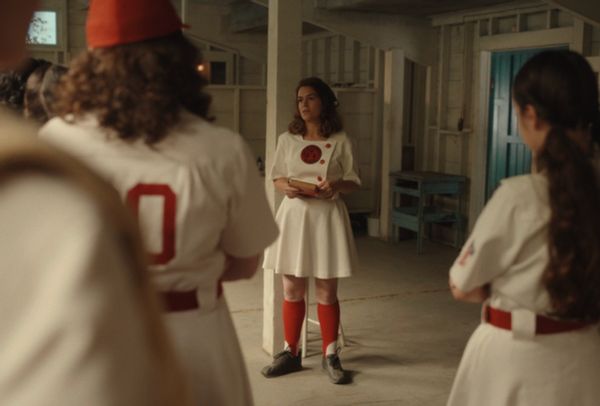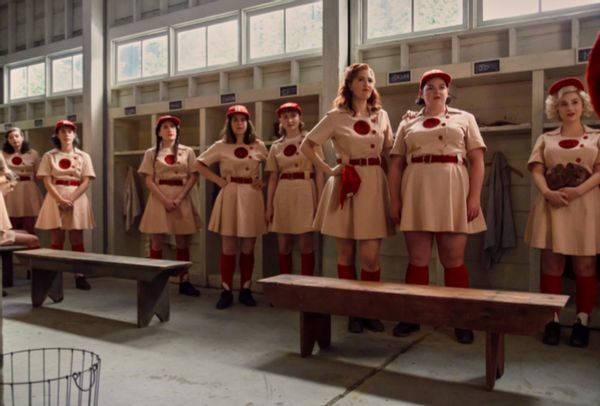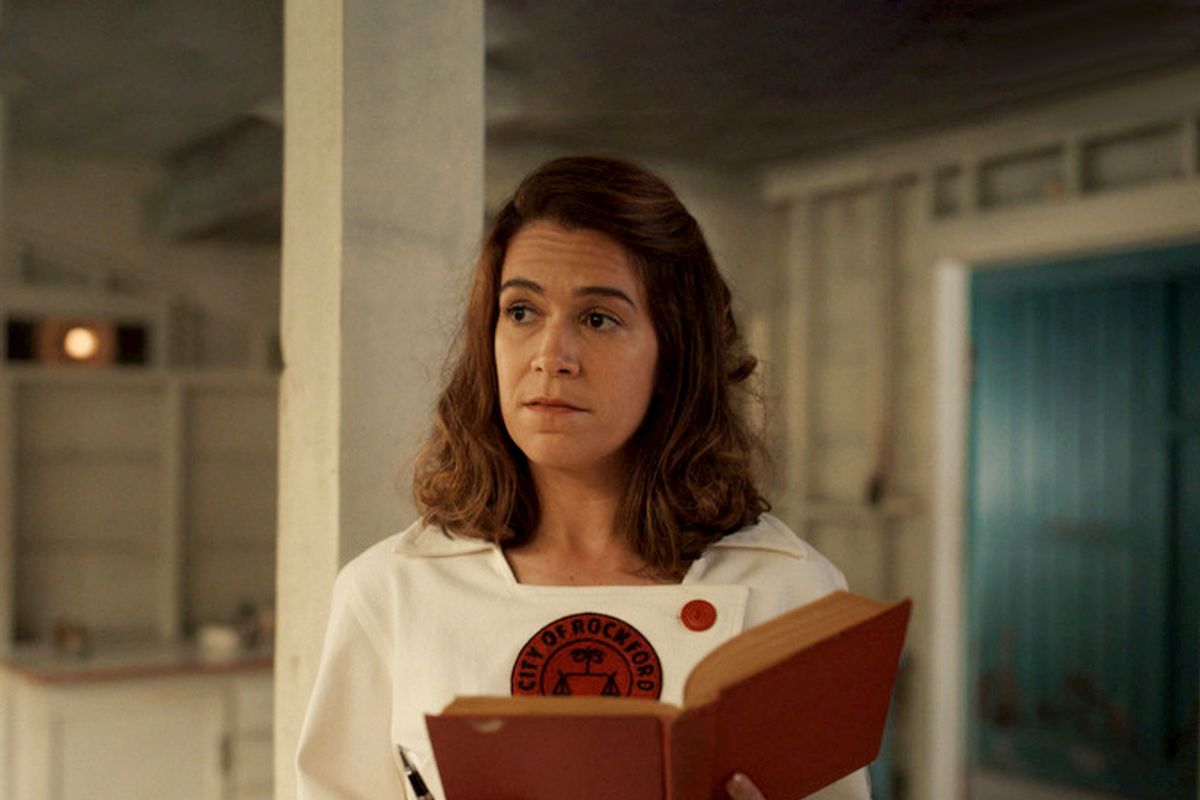In Prime Video's series adaptation of the 1992 film, "A League of Their Own," friends can mean a lot of different things, same as the act of playing baseball. Throughout the eight episodes of this first season we're shown the different ways in which women grant themselves permission to make the most of what they have while they have it, and encourage in each other the desire and the freedom to want more — even more than they could have ever dreamt was possible.
Betty Smith's 1943 novel, "A Tree Grows in Brooklyn," handed from one character to another in the second episode, and not referenced again until the last, encapsulates in many ways the heart of the show in that it too deals with hope that roots with little to no encouragement from outside forces — thriving in defiance and kept going by sheer will to grow into something bigger than it started as.
In the second episode, "Find The Gap," we see the character Carson Shaw (Abbi Jacobson) beginning to realize that breaking away from her town, her judgmental sister, and her off-to-war husband to join one of the first women's professional baseball teams, the Rockford Peaches, is just the beginning of a new life filled with desires that she never knew she was allowed to want in the first place. One of those desires comes in the form of a teammate named Greta Gill (D'Arcy Carden) who, although bolder than Carson, is also fueled by the encouragement of the women around her to never feel guilty for wanting something, even if that something goes against the norm of the times.
Seeing Carson struggle with guilt over quite literally running off to pursue her dreams while her husband Charlie (Patrick J. Adams) is off fighting as a soldier in World War II, Greta tells her, "I don't think you're running away from anything. I think you're running towards your destiny." While eavesdropping on a phone call Carson has with her sister – in which she's shamed for being seen visibly sweating, with her bra hanging out, hurrying to catch the train that brought her to Illinois – Greta takes a book off of a shelf and interrupts her call to give it to her.
"Here, I think you should read this book. You'll like it," Greta says, laying it down and exiting the room to give Carson her privacy. Only sharp-eyed viewers would have caught its title at that point. It's not until the last episode, "Perfect Game," that we see "A Tree Grows in Brooklyn" again when Carson reads an emotional and inspiring passage from it to the Peaches before they go on to play the last game of the season, which they lose, but only after winning so much more.
 Abbi Jacobson as Carson Shaw (Courtesy of Prime Video)"A Tree Grows in Brooklyn" centers on the story of a young girl named Francie Nolan and follows her as she strives to carve out a life for herself in a time and place when the world felt small on a day-to-day basis, but still large enough to swallow her whole and sink her down. Francie's mom is overworked, her dad's an alcoholic, and she doesn't have any friends outside of her own younger brother, Neeley. Her world is only as big as whatever rundown Brooklyn apartment she and her family are living in at the time, and everything she learns comes from observation, or from two tattered books her mom insists she read from on a daily basis: the Protestant Bible, and the complete works of Shakespeare. When we first meet Francie it's 1912 and she's 11 years old. At the end of the book she's 17, saying goodbye to the trappings of her youth as she enters womanhood and prepares to start college at the University of Michigan.
Abbi Jacobson as Carson Shaw (Courtesy of Prime Video)"A Tree Grows in Brooklyn" centers on the story of a young girl named Francie Nolan and follows her as she strives to carve out a life for herself in a time and place when the world felt small on a day-to-day basis, but still large enough to swallow her whole and sink her down. Francie's mom is overworked, her dad's an alcoholic, and she doesn't have any friends outside of her own younger brother, Neeley. Her world is only as big as whatever rundown Brooklyn apartment she and her family are living in at the time, and everything she learns comes from observation, or from two tattered books her mom insists she read from on a daily basis: the Protestant Bible, and the complete works of Shakespeare. When we first meet Francie it's 1912 and she's 11 years old. At the end of the book she's 17, saying goodbye to the trappings of her youth as she enters womanhood and prepares to start college at the University of Michigan.
Want a daily wrap-up of all the news and commentary Salon has to offer? Subscribe to our morning newsletter, Crash Course.
In an early passage of "A Tree Grows In Brooklyn" Francie and her family have just moved from one apartment to another and she does a mental inventory of their few possessions, one of which is a conch shell kept on a shelf that she has named "Tootsy." Having never been to the beach, although it wasn't terribly far from where they lived, all she knew of the ocean was gleaned from the mental images that would flood her mind when she pulled Tootsy down from the shelf and held it to her ear. Later, when her dad took her to Canarsie to see the ocean for the first time ever, she found that she preferred what she heard inside her shell at home over the real sound of crashing waves. In the book, Smith describes this moment writing, "The sea was remarkable only in that it sounded like the tiny sweet roar of Tootsy, the conch shell."
The Peaches have never been told anything other than "you can't." But in their own minds, and whispered safely to those they trust, "you can't" turns into "the hell I won't."
Reading passages such as this one, it's clear why this book was chosen specifically to reference in "A League of Their Own." Carson, the rest of the Peaches, and the character Max (Chanté Adams) — a fellow ball player pushing through closed doors as a Black queer woman in the 1940s — have never been told anything other than "you can't." But in their own minds, and whispered safely to those they trust, "you can't" turns into "the hell I won't."
Like Francie in "A Tree Grows in Brooklyn," most of us grew up thinking that if we put a seashell to our ears we could hear the ocean inside of it. Somewhere in between the vast dreaminess of youth and the lowered ceiling of reality brought about by adulthood was the theory that the sound we heard was caused by our own blood rushing in our ears — as though something so average as our body's constant chore of keeping itself alive could be made grander in our hopefulness to make that very life larger than it was — to connect it to something unknown and outside of ourselves like the unexplored depths of the sea. The final fact and indisputable knowledge that what we hear in a shell is nothing more than ambient noise, amplified in a concave chamber makes no difference. Women like Carson, Greta, Max, and the rest of the Peaches granted themselves permission, long ago, to accept a larger explanation. A more monumental option. And there's no going back.
In "A League of Their Own" Carson's character starts off as a catcher with a strong batting arm, and by the end she's the team's head coach. She's not a natural leader, but she's the best leader because in her learning how to encourage herself, she encourages others. All she needed to get herself going was that initial thought of "maybe I can do this." And when that turned into "I don't ever want to go back to not doing this," she was, at that point, strong enough to fertilize that same sprouting seed in the rest of her teammates.
Abbi Jacobson, who not only stars in the show but co-creates it along with producer, director and screenwriter, Will Graham, plays Carson as insecure, because she sees a lot of the character in herself. In an interview with The New York Times Jacobson refers to herself as "an introvert masquerading as an extrovert" saying, "The stories that I want to tell are about how I'm a messy person, and I'm insecure all the time. And then what if the most insecure, unsure person is the leader? What if the messy person gets to own herself?"
Prior to "A League of Their Own," Jacobson was best known for "Broad City," which she created and starred in along with friend and co-creator Ilana Glazer. That show, which centers on the stories of two friends trying to make lives for themselves in New York, began as a web series in 2009, got picked up by Comedy Central in 2014, and ran until 2019. In a video interview with Huffington Post several years ago, Jacobson talks about how she and Glazer made the leap from web series to one of the best ranked TV shows of the 2010s through their own sheer will and the extended hand of actress, writer and comedian, Amy Poehler. Jacobson has referenced Poehler's early encouragement of her in interviews leading up to the premiere of "A League of Their Own," and mentions in that earlier Huffington Post video that she told her and Glazer to always be the "police of their own brand." The ways in which that encouragement from one woman to another lit a fire within her to continue encouraging herself, and other women, is tangible in "A League of Their Own."
 The Rockford Peaches (Courtesy of Amazon Prime)
The Rockford Peaches (Courtesy of Amazon Prime)
"Let me be hungry or have too much to eat. Let me be honorable or let me sin. Only let me be something every blessed minute."
From the moment Greta gives Carson a copy of "A Tree Grows in Brooklyn" in Episode 2, till Carson carries it into the locker room before their big game in the finale, life is growing. At the start of her speech to her team, Carson opens the book and reads, "Let me be something every minute of every hour of my life. Let me be cold, let me be warm. Let me be hungry or have too much to eat. Let me be honorable or let me sin. Only let me be something every blessed minute."
As the rest of the Peaches stand in front of her – confused, frustrated and nervous in the face of this one last game that will not only make or break their shot at winning the series, but end their time in this new world of freedom they've created for themselves — or at least this version of it, Carson explains.
"So in this book, there's a tree that grows out of cement. No one waters it. It hardly gets any light. No one pays any attention to it. But somehow, it still finds a way to grow. That's us."
During the 1940s timeline in which "A League of Their Own" is set options were, by design, limited for women. Even more so for Black women like Max. It may be hard for us now to imagine a time like that where even a woman's dreams were limited because they had no frame of reference for what to dream of beyond . . . more. Sometimes there's a passion that grows inside of you that there's no name for. When Greta gives Carson that copy of "A Tree Grows in Brooklyn," and punctuates her days with stolen kisses as though waking her from a deep slumber, she shines further light on what was already starting to grow inside. And from that first seed of "more" grew branches. And those branches grew strong enough to hold the weight of anyone else who found it within themselves to hold on.
"How do you want this to end?" Carson asks her team before they head out for that last game. And the answer to that question, which has meaning beyond the game of baseball, or even new love, is a passionately implied, "We don't. It can't."
Read more
about this topic



Shares